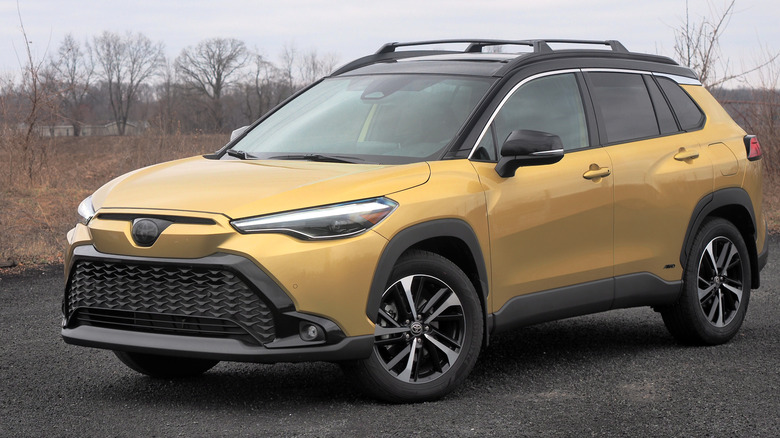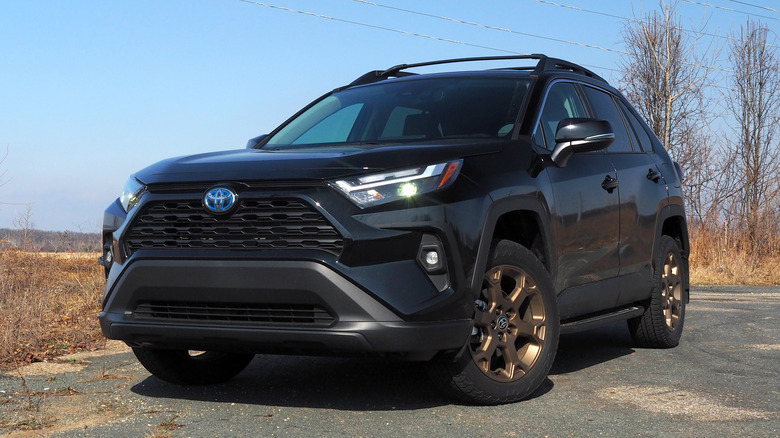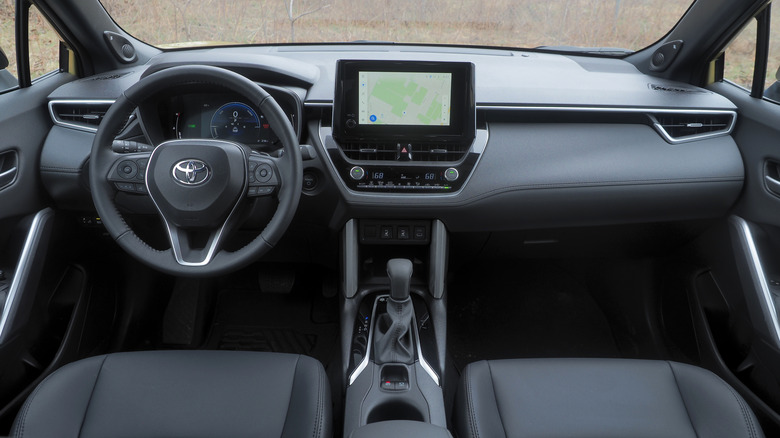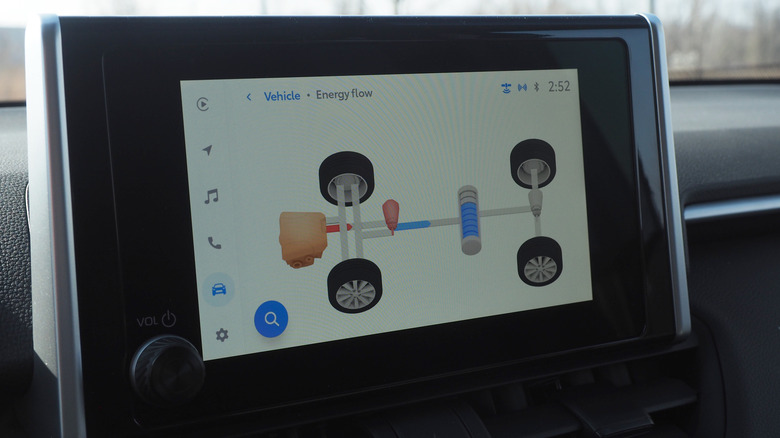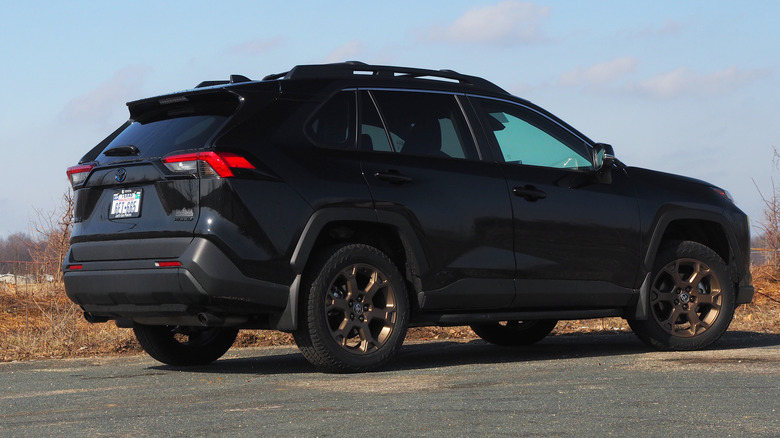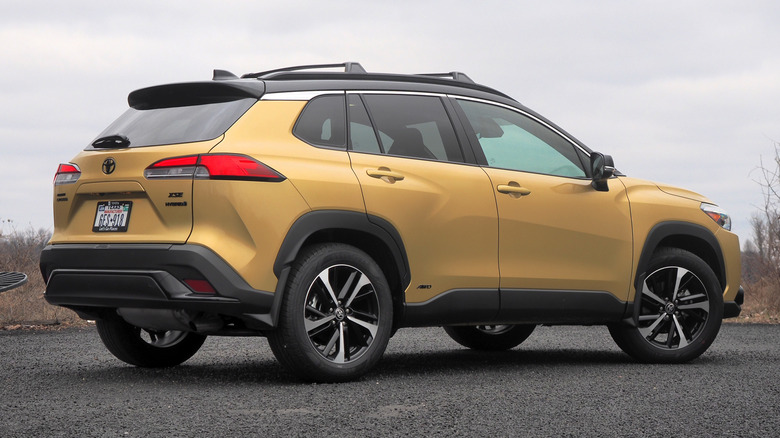RAV4 Hybrid Vs Corolla Cross Hybrid: Electrified Toyota Crossover Showdown
With consumer demand for crossovers so strong and hybrids offering a straightforward way to improve fuel economy, it's no surprise that Toyota has two electrified compact SUVs in its line-up. The Corolla Cross Hybrid and the RAV4 Hybrid each offer not only a gateway into Toyota ownership but also a cost-effective way to transport a family without too much pain at the gas pump.
The RAV4 is a familiar prospect at this point, now in its fifth generation and Toyota's strongest-selling model in the U.S. so far in 2024. The RAV4 Hybrid is also the electrified Toyota to beat, besting any other electrified car from the automaker in U.S. sales this year.
Smaller, newer, and — importantly — cheaper, the Corolla Cross Hybrid has made a strong start in 2024 sales. Certainly, leveraging the Corolla brand while also offering more space seems like a recipe for success. The question any hybrid crossover shopper might be facing is, what are the key differences between the Corolla Cross Hybrid and the RAV4 Hybrid?
Corolla Cross Hybrid is smaller, but with some surprises
As Toyota's smallest crossover, the Corolla Cross Hybrid is unsurprisingly smaller than the RAV4 Hybrid, though not by much. At 176 inches long and 72 inches wide, it's actually just 5 inches shorter and an inch narrower than the RAV4 Hybrid. While going off-road probably isn't top of any owner's list of priorities, both models have around 8 inches of ground clearance.
Inside, though, the space figures might surprise you. Though the bigger vehicle, the RAV4 Hybrid actually has almost two inches less front legroom than the Corolla Cross Hybrid and almost two inches more headroom. Taller drivers may prefer it, then, though those who are wider might still be swayed by the RAV4 Hybrid's broader hip and shoulder room.
In the back, the RAV4 Hybrid claws back its advantage. Its 37.8 inches of legroom is almost half a foot more than the Corolla Cross Hybrid offers, and it's more spacious for both hips and shoulders. The headroom is roughly the same. Cargo space is also truncated in the smaller SUV: 40 cu-ft in the RAV4 Hybrid, but just 24 cu-ft in the Corolla Cross Hybrid with the rear seats upright.
RAV4 Hybrid is better-equipped - if you pay
The RAV4 Hybrid has the potential to be a better-equipped place to spend your journey, too, though that's trim-dependent. Pricing for the 2024 Toyota Corolla Cross Hybrid starts at $28,220 (plus destination), a $4,360 premium over its gas-only counterpart. The 2024 Toyota RAV4 Hybrid, meanwhile, starts at $31,725 (plus destination), a $3,050 premium over the gas-only model.
The base trim of both hybrid crossovers get an 8-inch infotainment system with six-speaker audio. Step up through the trims, though, and the RAV4 Hybrid enjoys a much larger 10.5-inch touchscreen and up to an 11-speaker JBL audio system. The bigger car also gets dual-zone climate control as standard, rather than just single-zone, and can also be equipped with ventilated front seats, as well as heated.
The RAV4 Hybrid also enjoys optional convenience features like 12V/120W power outlets in the front and in the cargo area, and it can be equipped with a power liftgate. The Corolla Cross Hybrid, in contrast, has a manual liftgate. Finally, there's towing capacity: up to 1,500 pounds in the Corolla Cross Hybrid versus up to 1,750 pounds in the RAV4 Hybrid.
Hybrid advantages
Although both SUVs are electrified, the drivetrain differs between the two. The Corolla Cross Hybrid pairs a 2.0-liter inline-four gas engine with three electric motors; the RAV4 Hybrid has a larger, 2.4-liter inline-four gas engine and two electric motors. Total system power is 219 hp in the RAV4 Hybrid and 196 hp in the Corolla Cross Hybrid.
Either way, the result is a perkier experience on the road compared to the gas-only versions. That's partly a factor of having more power — the gas RAV4 makes 203 hp, and the gas Corolla Cross Hybrid makes 169 hp — but also how that power is delivered. While the electric motors may only be partly responsible for the total grunt, their immediate delivery of torque results in an SUV that feels more urgent, particularly at city speeds.
All-wheel drive is standard on both models, though, unlike their gas-only equivalents, there's no physical connection between the engine at the front and the rear axle. Instead, they rely on what Toyota calls Electronic On-Demand All-Wheel Drive, where a dedicated electric motor powers the rear axle when extra performance or traction is required.
Strong economy regardless of crossover
Frugality is one of the primary reasons new car shoppers consider a hybrid vehicle, and both the Corolla Cross Hybrid and the RAV4 Hybrid comfortably outperform their gas-only counterparts when it comes to efficiency. That's despite requiring no change in behavior when it comes to refueling.
On the highway, both of the Toyota crossovers are rated at 38 miles per gallon (mpg) by the U.S. EPA. It's urban driving where the Corolla Cross Hybrid's strengths play out. The official EPA City rating is 45 mpg, compared to the RAV4 Hybrid's 41 mpg.
The result is a 39 mpg combined rating for the RAV4 Hybrid and 42 mpg combined for the Corolla Cross Hybrid. It's worth pointing out that it is significantly better when it comes to fuel economy savings than the average new vehicle in 2024. According to the EPA, RAV4 Hybrid drivers will save $2,500 in fuel costs over five years compared to that new car average, while Corolla Cross Hybrid drivers will save $3,000.
A Corolla Cross Prime could change the game
If there's a wildcard, it's the drivetrain option that the RAV4 enjoys that its smaller crossover sibling can't yet be bought with. The Toyota RAV4 Prime is a plug-in hybrid, matching the gas-electric engine pairing with a larger battery that can be plugged in to charge.
The result is 42 miles of electric-only range, according to the EPA, and an MPGe rating of 94 combined. Over the course of five years, the EPA says, an RAV4 Prime owner could save $4,250 compared to the average new car. That is, assuming they actually plug their PHEV in.
Conspicuous by its absence, for the moment at least, is a plug-in hybrid version of the Corolla Cross. Toyota offers a Prius PHEV and an RAV4 PHEV but is tight-lipped on whether a Corolla Cross Prime could be on the roadmap. Given the automaker's push to embrace a wide selection of electrified models — rather than betting solely on fully-electric — we wouldn't bet against it.
